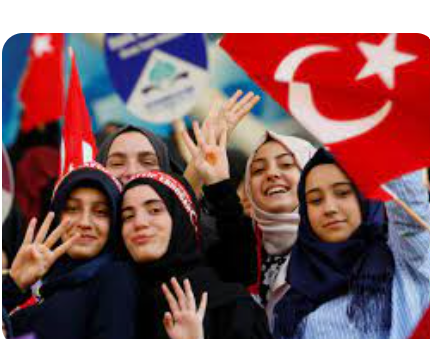Ankara based independent think-tank TEPAV issues frequent reports in leading topics on the Turkish agenda, which deserve sharing with an international audience. This report explores the vexing question of how pious citizens of Turkey are. The results are striking. They are not. The findings may explain why Islamist-conservatives continuously vote for Erdogan, even though the second part of his ongoing reign has been marked with economic volatility, hurting AKP voters the most. Because, his voters follow King’s religion, and he is the King.
The report focuses on two large-scale surveys conducted in 2016 and 2020, with representative samples of 6,989 and 7,280 individuals, respectively. These surveys included qualitative questions designed to comprehend religious identity and attitudes toward religion in Turkish society, examining the extent of religiosity and the degree to which differences in beliefs and ethnic/religious backgrounds are tolerated. Qualitative here refers to, and is in contrast with, quantitative questions such as whether survey participants fast all through Ramadan, pray five times a day, etc.
A secondary objective of the study was to identify groups within Turkish society exhibiting radical tendencies, i.e., individuals personally intervening, particularly through the practice of takfir and declaring a self-proclaimed Muslim as an infidel (kafir). Notably, the 2016 and 2020 surveys represent the inaugural instance of a qualitative survey on these topics conducted for the first the time in a Muslim country, as far as we know.
The outline
The report is structured into three chapters. Chapter 1 seeks to provide a comprehensive understanding of how religion is perceived and practiced in Türkiye and how it has evolved over time. In Chapter 2, the aim is to establish the extent to which differences in beliefs and religious/ethnic backgrounds are tolerated in Türkiye. Finally, Chapter 3 identifies respondent groups with radical religious attitudes, captured by the practice of takfir or the differentiation of others as infidels (kafir). In this context, an ideological radicalism index is constructed to evaluate survey findings.
Striking findings
The findings of the report indicate that religion in Türkiye is predominantly a cultural practice rather than institutionally rooted. Simultaneously, the findings reveal a decline in the prevalence of religious practices such as daily prayers, fasting during religious months, and wearing the headscarf, particularly among the younger, more educated, and working populations. Furthermore, the surveys reflect pluralistic attitudes among the predominantly Muslim population.
Little sign of radicalism
Finally, the survey findings reveal that the prevalence of radical religious attitudes among respondents is low and demonstrates a decreasing trend. Social exclusion emerges as a significant factor influencing radical religious attitudes, with religiosity playing a role, albeit to a lesser extent. TEPAV’s upcoming study aims to explore the impact of various socio-economic factors on changing radical religious attitudes.
Visit the link for the full study
Follow our English language YouTube videos @ REAL TURKEY: https://www.youtube.com/channel/UCKpFJB4GFiNkhmpVZQ_d9Rg
And content at Twitter: @AtillaEng
Facebook: Real Turkey Channel: https://www.facebook.com/realturkeychannel/
